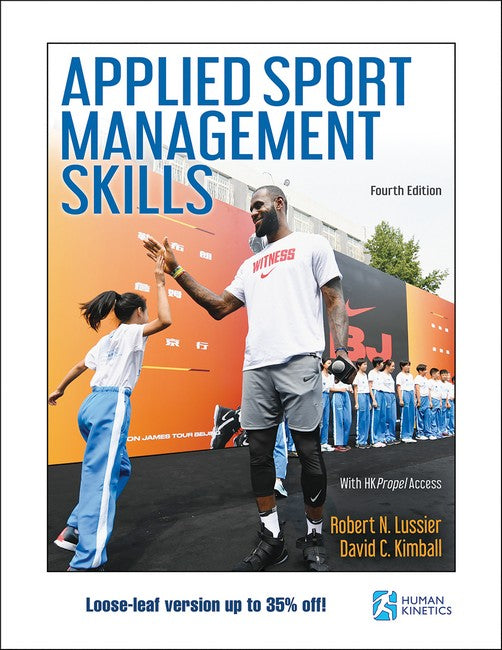Robert N. Lussier, PhD, is a professor emeritus of management at the birthplace of basketball, Springfield College, where more than one-third of the students compete in intercollegiate athletic teams. He has taught undergraduate and graduate sport management students for more than 30 years. He has also supervised sport internships and serves as an advisor for sport management research projects. Lussier was an intercollegiate cross country and track athlete and has coached at the college, high school, and youth levels. He is a prolific writer with more than 500 publications, including articles in top refereed journals, with more than 11,000 Google Scholar citations. Over two million people globally have used his textbooks, earning him an unsurpassed national and international reputation as an author. Dr. Lussier is the founder of Publish Don't Perish (www.publishdonotperish.com). Through his book Publish Don't Perish: The Top Secrets to Get Published and workshops, he has helped hundreds of institutions and individuals in more than 80 countries get published. Dr. Lussier also provides consulting services to a wide array of commercial and nonprofit organizations. In fact, some of the material in the book was developed for such clients as Baystate Medical Center, Coca-Cola, Friendly's, National Institute of Financial Education, Mead, Monsanto, Smith & Wesson, the Social Security Administration, the Visiting Nurse Association, and YMCAs. Dr. Lussier holds a bachelor of science in business administration from Salem State College, master's degrees in business and education from Suffolk University, and a doctorate in management from the University of New Haven. David C. Kimball, PhD, is a professor of management and the director of the sport management program at Elms College. He teaches sport management and sport marketing courses. As coordinator of the sport management internship program, he has placed many students in internships that offer real-world experience. Kimball has helped develop and promote sporting events for organizations such as Junior Achievement and the JCC Maccabi Games, and he coaches and supervises Maccabi athletes each summer. He has an expansive network of friends and acquaintances in the sport management field; many of the case studies in this book arose from these relationships.
Request Academic Copy
Please copy the ISBN for submitting review copy form
Description
Part I. Introduction to Sport Management Chapter 1. Managing Sports Why Study Sport Management? The Sport Industry and Sport Management Sport Manager's Responsibilities What Does It Take to Be a Successful Manager? What Do Sport Managers Do? How Do Managers Differ? Learning Aids Chapter 2. The Sport Industry Environment: Globalization, Ethics, and Social Responsibility Internal Environment and Quality in Sport External Environment Conducting Sport Business in a Global Environment Ethics in Sport Management Why Good People Use Unethical Behavior Guides to Ethical Behavior and Managing Ethics Social Responsibility and Sustainability Learning Aids Part II. Planning Chapter 3. Creative Problem Solving and Decision Making An Overview of Problem Solving and Decision Making Step 1: Define the Problem or Opportunity Step 2: Set Objectives and Criteria Step 3: Generate Alternatives Step 4: Select the Most Feasible Alternative Step 5: Plan and Implement the Decision Step 6: Control the Results Learning Aids Chapter 4. Strategic and Operational Planning An Overview of Strategic and Operational Planning Strategic Process Analysis of the Environment Setting of Objectives Corporate-Level Strategy Business-Level Strategy Operational-Level Strategies Implementing and Controlling the Strategies Learning Aids Part III. Organizing Chapter 5. Organizing and Delegating Work The Organizing Function Authority Organizational Design Job Design Organizing Yourself and Delegating Work Learning Aids Chapter 6. Managing Change, Culture, Innovation, and Diversity Managing Change Organizational Culture Innovation and Quality Diversity, Equity, and Inclusion (DE&I) Diversity Groups and Sports Organizational Development Learning Aids Chapter 7. Human Resources Management Human Resources Management Process and Department Legal Environment Human Resources Planning and Job Design Attracting Employees Interviewing Developing Employees Performance Appraisals Retaining Employees Learning Aids Part IV. Leading Chapter 8. Behavior in Organizations: Power, Politics, Conflict, and Stress Organizational Behavior and Thoughts Personality Perception Attitude Formation and Behavior Power Politics in the Office and on the Field Managing Conflict Negotiation Collaboration Conflict Skills Stress Learning Aids Chapter 9. Team Development Importance of Teamwork to Performance Group Performance Model Group Structure Group Process Stages of Group Development and Leadership Styles Getting to Better Meetings Learning Aids Chapter 10. Communicating for Results Understanding the Importance of Good Communication Using Organizational Communication Using Interpersonal Communication Using the Channels Sending Messages Receiving Messages Responding to Messages Dealing With Emotions and Criticism Learning Aids Chapter 11. Motivating to Win Motivation and Performance Content-Based Motivation Theories Process-Based Motivation Theories Reinforcement Theory Putting Theory to Work Within the Motivational Process and Motivating Yourself Learning Aids Chapter 12. Leading to Victory Leadership Behavior of Effective Leaders Contemporary Behavioral Perspectives Situational Leadership Theories and Models Getting to Your Personal Style of Leadership Learning Aids Part V. Controlling Chapter 13. Controlling Quality, Financials, Productivity and Managing People Quality and Control Systems Control Process Frequency of Controls Financial Controls Managing People Managing Problem Employees Productivity Learning Aids Chapter 14. Facilities and Events Management Sport Facilities and Event Management Sport Facilities Management Sport Event Management Planning and Controlling Sports Sales Forecasting Techniques Scheduling Tools Time Management Learning Aids Afterword: The Future of Sport Management Appendix: Careers in Sport Management

